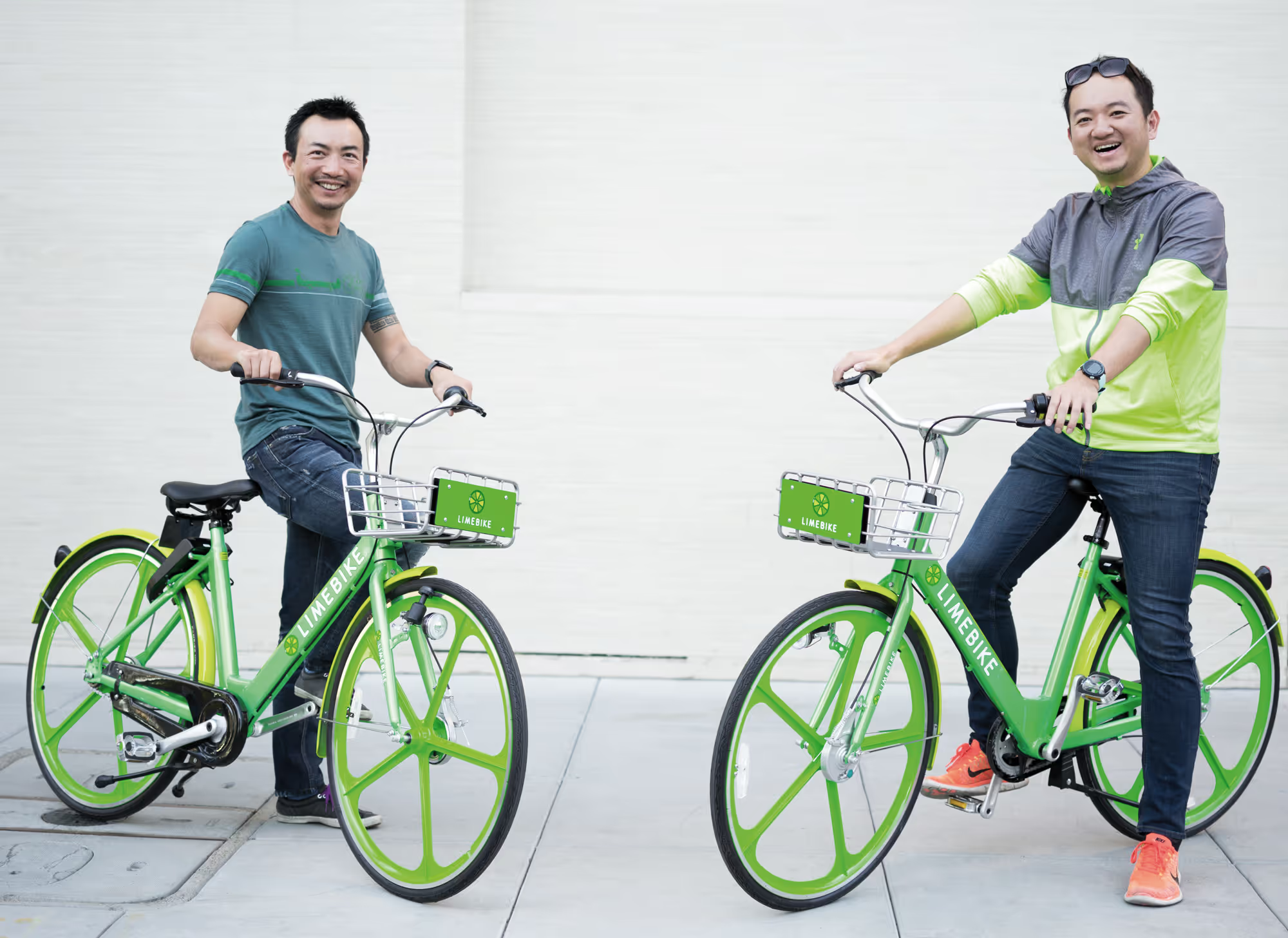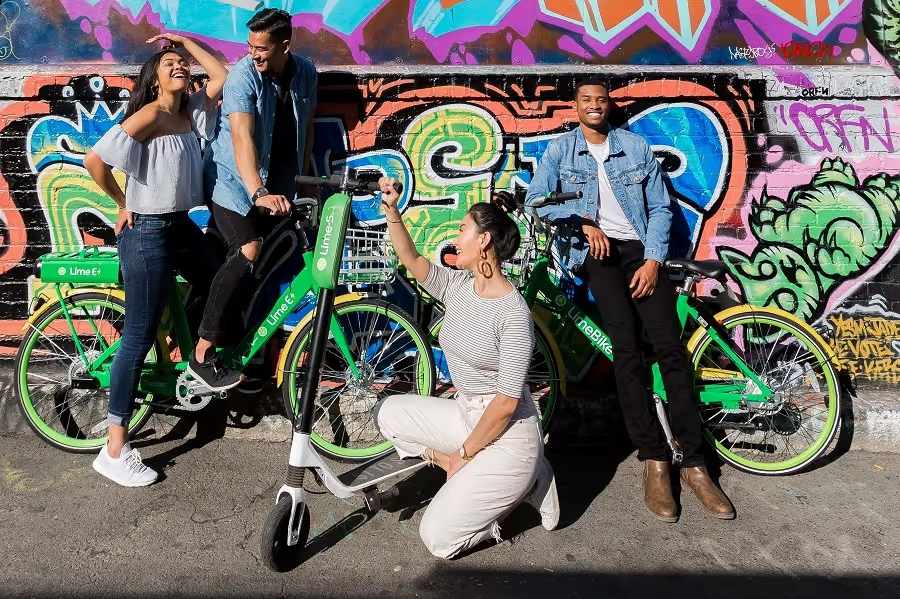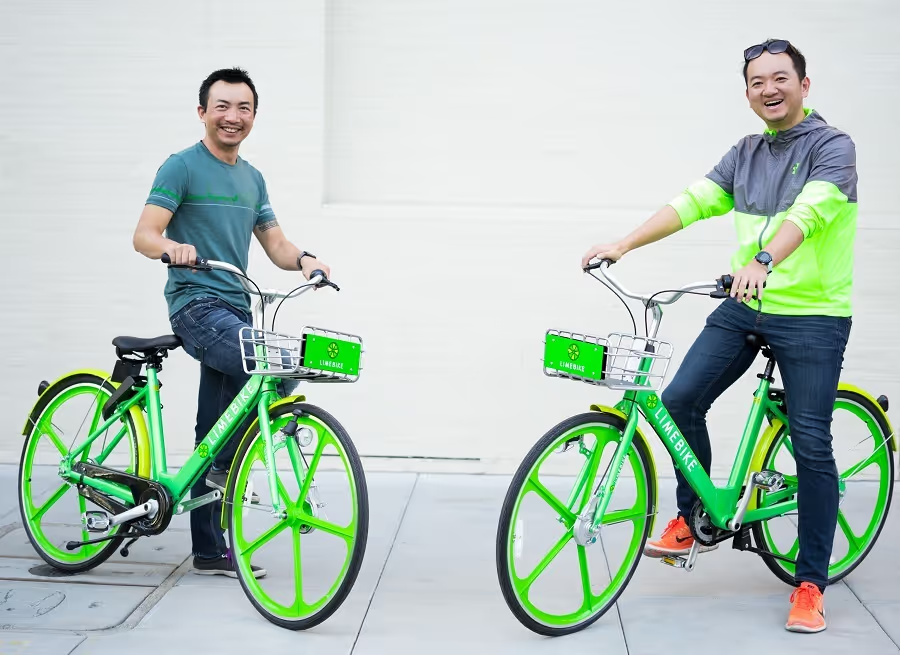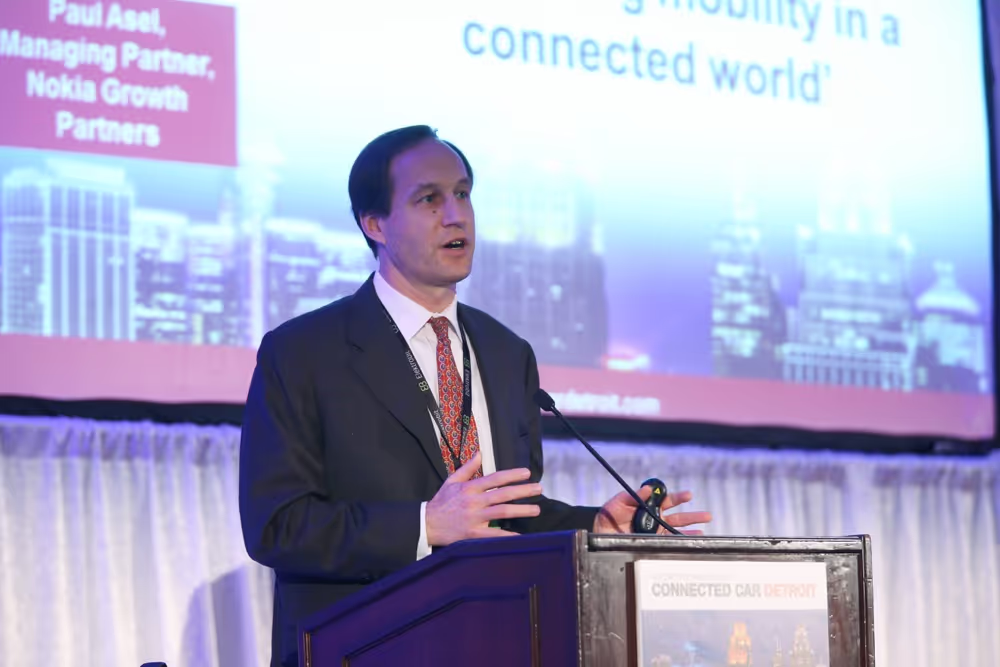Listen now
How Lime became one of the pioneers in smart mobility
Lime, formerly LimeBike, was founded in January 2017 on the idea that all communities deserve access to smart, affordable mobility. Based in San Mateo, California, Lime now operates a large fleet of shared scooters and bikes across North America and Europe.
At first, Lime started by sharing pedal bikes; scooters came into the picture later. Still, starting from day one, co-founders Toby Sun and Brad Tao had a bigger vision than just renting bikes — they wanted to reduce the dependence on personal automobiles for short-distance transportation and leave a cleaner environment for future generations.
A different sort of background
Toby and Brad both grew up in China and met as alumni of the University of California, Berkeley. Both of them have extensive business experience in marketing, product development, and business development prior to launching Lime.
Toby worked in product innovation for PepsiCo helping to deliver a world-class brand in a local market and after that for Deloitte Consulting, monitoring Deloitte Strategy Service Line. Brad’s experience is in marketing and business development; he was VP of business development for Tencent Games and before that a general manager for the Tencent US branch. Also, prior to founding Lime, they worked together in a venture firm they started, investing in internet start-ups.

Today, Brad handles the internal aspects of the company, such as product technology and operations, and Toby takes care of external duties, such as stakeholder relationships and marketing.
TS: Our backgrounds affect how we think about Lime. We believe that branding and culture are important ingredients for Lime’s success. Also, our experience in the venture capital industry gave us a higher-level perspective on global competition, as well as experience looking into exciting product areas like autonomous vehicles and dock-based bike-sharing.
“We believe that branding and culture are important ingredients for Lime’s success.”
Toby and Brad wanted to create a micro-mobility platform to move people efficiently and cost-effectively within a metro area. They call Lime a user-centric mobility platform that asks, “what more can we do for our users.”
What makes their scooters, which travel at a maximum of 15 mph, so popular?
BB: I think the scooter is an interesting product that solves a problem from both a mobility and a flexibility perspective. Scooters are really the best fit for a distance of just a few blocks. Also, they’re a lot of fun; they make people smile. And you don’t have to worry about traffic on a scooter in the same way you do when driving a car.

Hitting the global road
Lime now operates in more than 100 markets in the US, Canada, Europe, and New Zealand and recently announced a $335 million funding round led by GV with participation from Uber at a $1.1 billion valuation.
Clearly, a lot has happened in a short time. Toby and Brad believe that Lime’s rapid growth has been due to several factors, including perfect timing and technology that was ready for adoption.
TS: We are excited to have Uber as our strategic partner in the electric scooter space. We are very complementary to each other. Uber has great product expertise and has focused for years on online systems and building marketplaces. The global footprint they provide and the potential user overlap represent huge opportunities for us.
“We are excited to have Uber as our strategic partner in the electric scooter space.”
The partnership between Lime and Uber reinforces the importance of first and last-mile transportation. Consumers want clean, convenient transportation alternatives to driving a car. With increasing evidence of the catastrophic impacts of global warming, people have started demanding cleaner products and services.
BB: Global warming is real and it will happen even faster
if we don’t step up and take action. Lime is doing pioneering work to make our product lifecycle greener and more eco-friendly. We just announced that all of our scooters and electric bike rides globally will be carbon neutral. We are also taking proactive steps to build green energy partnerships and have hired a VP of sustainability.
Changing the culture of mobility
Leading a fast-growing company is not easy and there are a number of challenges that keep the co-founders awake at night.
BB: For me, the biggest challenge is the battle around changing the culture of mobility. I’m constantly thinking about what we can do here in the US to make eco-friendly transportation compelling and battle the culture of cars. Changing the prevailing car culture is the hardest thing.
“With almost 500 employees, Lime is no longer a startup, yet growth continues at a breakneck pace.”
TS: I’m challenged by the complexity of our business. I wake up every day thinking about how to build a strong core to support business growth, find like-minded people who share the same mindset and vision and keep up Lime’s inspirational culture.
When I worked in venture capital, one of the things I noticed was that a surprisingly large number of companies concentrate primarily on their product and how to get that product to users. For Lime, it has been all about our users and how we tailor our products and services to them and their needs.
“For Lime, it has been all about our users and how we tailor our products and services to them and their needs.”
BB: We are very proud of our company culture and people’s belief in our vision. We have had some difficult discussions in the past about core values. Today, we look above and beyond profit, guiding the company by first asking, “What is the right thing to do?” We were the first to carry insurance on our bikes and scooters and we were the first to provide cash access. It’s important for us to be authentic.
Having founded multiple startups — two for Toby, four for Brad — Lime’s co-founders have some advice for first-time entrepreneurs.
TS: Being an entrepreneur doesn’t necessarily mean founding an internet startup. An entrepreneur can be anyone, even a kid taking the initiative to open a shop that fills a need in a neighborhood. That kid is as much of an entrepreneur as anyone.
BB: The most exciting thing about founding a company is seeing the impact you make. You should remember that it’s not just about a good financial return, it’s also about doing good things for society, your community, and your employees.
“The most exciting thing about founding a company is seeing the impact you make.”
Two of a kind
Without the support from each other, Toby and Brad are not sure they ever would have founded Lime.
TS: What I appreciate about Brad is that he has a very wide range of interests. He has been, by far, my most important mentor. Brad is active, involved in running and hill-climbing, and he is curious about life. In college, he formed a rock-and-roll band; I remember the iconic hairstyle, which was a bit beyond the normal look he has nowadays.
BB: Toby and I are both runners, and are inspired to live a healthy and active lifestyle. We both work 120 hours a week, so we need to stay active in order to keep up our spirits. Not many people know that Toby made a new year’s resolution to run a minimum of one mile every day.
Lime, along with other new mobility services such as Uber and Lyft, has started to reshape how people make transportation choices. But the vision for Lime over the next few years is bigger than just a mobility platform.
TS: We want to become the default short-trip, on-demand service for getting people around cities. After that, we hope to transform our mobility platform into a lifestyle brand, where people can use Lime to make friends and live healthier lives.

.svg)






.svg)






